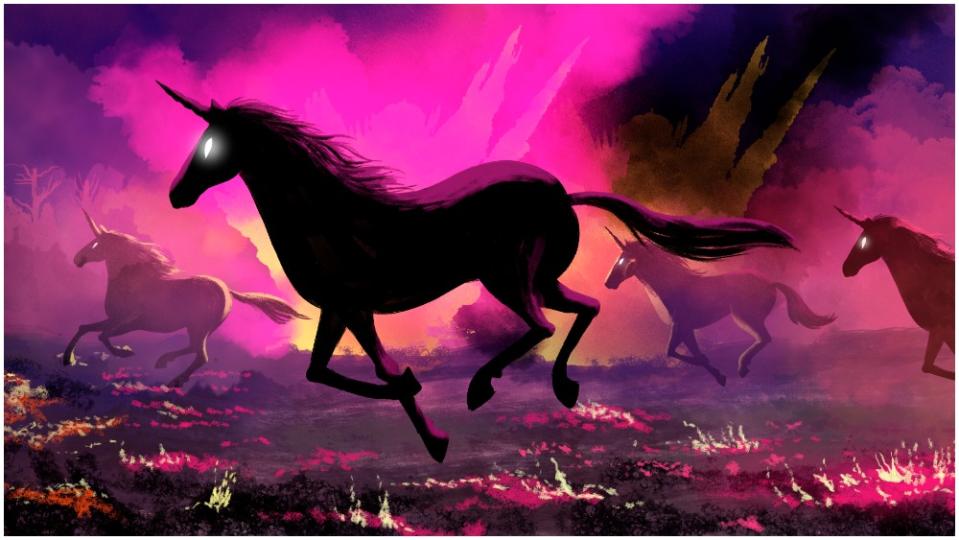Spain’s Animation Booms, Grapples Large Challenges
- Oops!Something went wrong.Please try again later.
- Oops!Something went wrong.Please try again later.

Alberto Vázquez’s “Unicorn Wars” is an Annecy competition frontrunner. “They Shot the Piano Player,” from Fernando Trueba and Javier Mariscal, weighs in as one of the festival’s most anticipated works in progress.
A bevy of Annecy MIFA unveils and score of Spanish titles, sometimes sneak peeked at other events, form part of a historic growth on Spain’s animation scene.
More from Variety
At March’s Cartoon Movie, only France had a larger number of titles than Spain. At September’s Cartoon forum, a showcase for long-form animation, Spain again ranks among European countries, in number of projects set to be pitched, tying with Ireland.
With an annual turnover of $950 million in 2021, according to Spanish trade promotion board ICEX, Spain also has first-class animation schools (U-tad, BAU, Lightbox Academy, La Salle, Universidad Politécnica de Valencia…) and specialized events such as Ibero-American Quirino Awards, Valencia’s Weird Market, Pamplona’s Next Lab Finance & Tech and Lleida’s Animac.
Produced with Netflix by Madrid-based SPA Studios, “Klaus” scored an Oscar nomination. Another Spanish title, “Buñuel in the Labyrinth of the Turtles” took an Annecy Jury Award. The first two instalments of animated movie franchise “Tad the Lost Explorer” bowed to top box office rankings in multiple countries outside Spain.
For most Spanish producers, this animation renaissance is driven by crucial new state regulation.
In 2020, a tax break hike catapulted Spain into the top echelon of destinations for big international shoots. Its mainland peninsula offer is a competitive 30% tax rebate for the first €1 million ($1.05 million) of spend and 25% for further expenditure, capped at €10 million ($10.4 million). In the Canary Islands, the rebates reach a mouth-watering 50% for the first $1.05 million and 45% thereafter, with a $18.7 million ceiling.
New regs also allow Spanish state incentives to account for 75% of total animated feature film budgets.
Other regions in Spain have also stepped up their backing. A new tax incentive system offered by Navarre includes –in addition to specific production aid – a 40% tax deduction. Catalonia has launched a specific funding initiative for animation. Madrid and Barcelona are setting up local animation and VFX hubs.
Spain’s boom may be part fruit of circumstance or a pandemic bump. “Live-action producers have turned their gaze towards animation, as the sector didn’t suffer the difficulties of cancelled shoots,” says Mago’s Peter Keydel, who will present “The Little Orchestra” at Cartoon Forum.
“We’ve never seen a period like this,” says Chelo Loureiro, producer of “Unicorn Wars,” alongside Uniko and Autour de Minuit.
But difficulties remain.
Some specific craft categories – senior animators, for instance – are extremely difficult to find, so salaries for those available for employment are going up, Loureiro says.
Some producers also urge caution about current trends.
“There are many adult-oriented projects and fewer addressing family audiences, which are key to strengthening the industry and engaging new viewers,” says Manuel Cristóbal, an executive producer on Annecy WIP title “The Glassworker,” a Pakistan production directed by debutant Usman Riaz.
Another main challenge is IP ownership.
“It’s too soon to start celebrating. The sector still has structural problems. For instance, access to finance and investment. We want to access money to generate our own IPs, not [to create content] for a major to come and buy it,” Next Lab Finance & Tech Director José Luis Farias says.
He adds: “We are working very frequently for companies abroad, but we have to think about what exactly we want. Do we want to become a high-quality services provider, or generate IPs that produce revenues in the future?”
Spain’s animation sector also fears a brain-drain. Three leading Spanish directors could well direct upcoming international productions with no Spanish production company involved, Variety has learnt.
For producer-director Carlos Fernández de Vigo at Dr. Platypus & Ms. Wombat, one pending issue is “to modernize financing models and review how we adapt them to a changing situation.” Fernández’s company will present at Annecy’s Next Lab partners conference “DinoGames,” directed by himself and Lorena Ares.
According to Variety research, eight animated features await release from June2022 through to the first quarter 2023. Another 26 are at different stages of development and production. Regarding TV-shows, six will launch this year, 26 are in development or production.
State and regional bodies as well as the animation studios need to rethink priorities and forge new international partnerships. That may already be happening. Out of the eight Spanish projects to be unveiled at Cartoon Forum, six are co-productions.

Courtesy of Cartoon Movie
Best of Variety
Sign up for Variety’s Newsletter. For the latest news, follow us on Facebook, Twitter, and Instagram.

